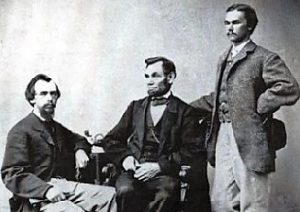
Lincoln and secretaries, Hay and Nicolay
Previously in the novel: War Secretary Edwin Stanton held President and Mrs. Lincoln captive under guard in basement of the White House. He guided his substitute Lincoln through his first Cabinet meeting. Then he told Lincoln’s bodyguard Ward Hill Lamon into believing Lincoln and his wife were in hiding because of death threats. Lamon comes to the White House to find out for himself.
Nicolay and Hay have not changed, Lamon thought, as he entered the room. Hay looked up from his desk where he was addressing envelopes, and smiled broadly.
“Hello, Ward.”
“Ward, we haven’t seen you in a while.” Nicolay said as he looked up from his letter opening. He smiled only briefly, yet Lamon took it as a warm reception since it came from the cold, bland Bavarian.
Lamon sat near Hay, throwing his feet up on the desk, as was his wont during Lincoln’s first year, when all was normal. He liked the secretaries immensely, Hay’s boyish charm and Nicolay’s reserved intelligence; still, Lamon had to learn what they knew about the president’s disappearance.
“Marshal’s office has been keeping me busy.” He looked from one to the other. “You two look no worse for the wear.”
“Thank you,” Hay replied, “and same to you.”
Taking a deep breath, Lamon continued, “I wish I could say the same about the old man.” His observation was met with silence. Perhaps he was being too subtle, so he turned directly to Hay, whom he considered the weak link. “Johnny, haven’t you noticed a difference in Mr. Lincoln?”
“Remember when we used to have booger-flicking contests?” Putting a finger up one nostril, Hay innocently returned Lamon’s gaze. “You always won.”
Lamon could not help but laugh, realizing, however, that Hay had not answered his question, deliberately or not, so he turned his attention to the inscrutable Nicolay.
“And you, John, have you noticed any changes in the president?”
“Mr. Lincoln hasn’t changed since those days in Springfield when we all first met him.” Ripping open a letter, Nicolay studiously read the contents.
“Those were the good old days with the president, weren’t they?” Lamon asked.
“Yes, Mr. Lincoln smiled more then,” Nicolay replied.
“Even the first year in the White House, the president made a few jokes,” Lamon continued.
“That was when we all, including Mr. Lincoln, still had hopes of an early resolution to the war.”
Narrowing his eyes at Nicolay, who kept his attention on the letters, Lamon then asked, “But since the time I saw him last, two months ago, Mr. Lincoln seems to have lost his spirit.”
“The president has had good days this fall. You just haven’t seen them.”
“Well, I guess I’ve been lazy long enough,” Lamon announced, putting his feet down and standing.
“Don’t be a stranger,” Hay cheerfully said.
“Ja, come back soon,” Nicolay added, finally raising his eyes.
Lamon walked out, very proud of himself, feeling he had outfoxed Nicolay, who did not want to tell a lie, yet did not want to betray a confidence, but by playing his word games had revealed what Lamon wanted to know. In talking about Lincoln, Nicolay called him by his name; however, when Lamon referred to the man in the president’s office as Mr. Lincoln, Nicolay followed up by calling the man Mr. President. That proved they knew the current president was not Mr. Lincoln; what Lamon still did not know was if they knew this was the plan of Mr. Lincoln, the man they called Mr. President, or, worst of all, Mr. Stanton.